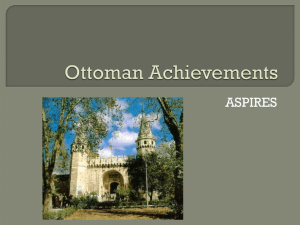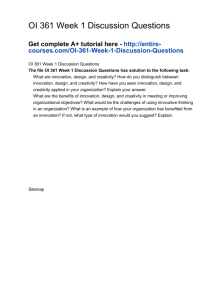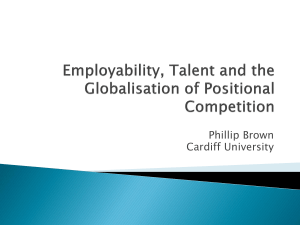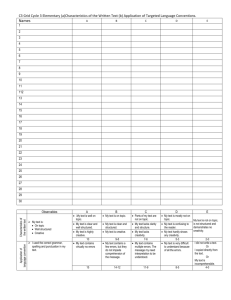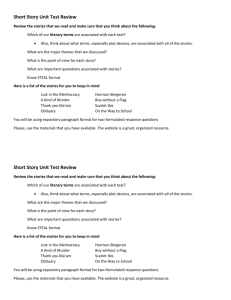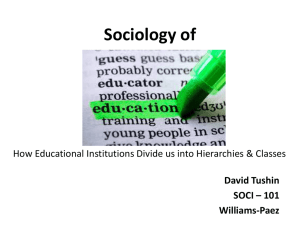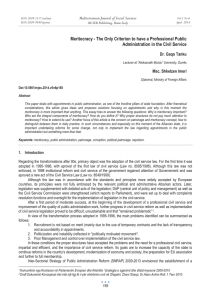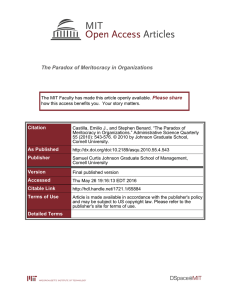Education - EL2014-3O2
advertisement
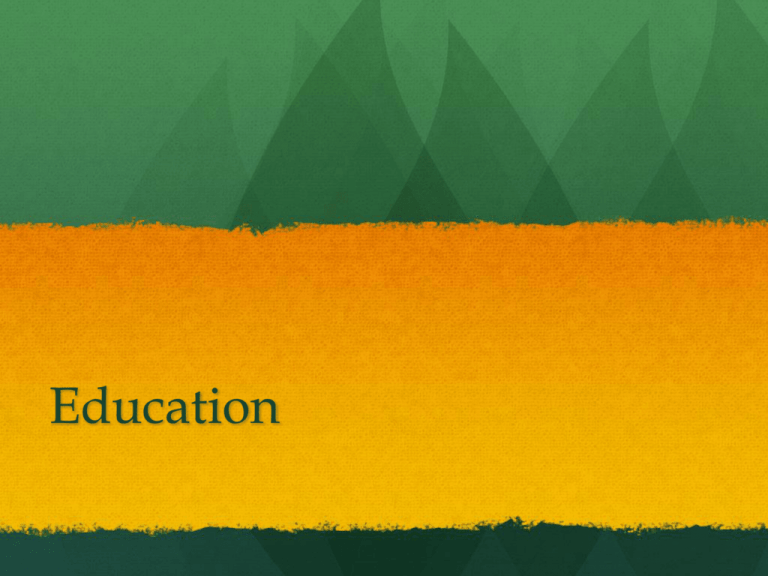
Education Education Formal education – formal academic studies and schools It can also refer to admirable human qualities that one acquires out of classroom Consider the larger aims of education That aims of education vary across cultures and time It is thus important to have a clear parameter when you are answering essay questions – are you talking about Singapore/ developed countries? Are you discussing formal education? Purposes of Education To put it simply, it refers to the reason to send children to school Education does not have a single goal; in fact, it serves multiple objectives We attend school not just to fill our minds with knowledge but in the process of acquiring these textbook knowledge, we also build our character, sharpen our critical eye and expand our minds. So it is just about getting a job? We’ve often been told that education is the ticket to employment, good pay and a bright future Pragmatic thus far. A person must still be equipped for a job so that he can earn a living and at the same time contribute to the society of which he is a member Employers still look at certification to ascertain the applicant’s capability – objective and easier From the perspective of the government Contribute to economy hence need to prepare the young for the workforce Overall skill level of the local labour force is one of the key drivers of local job growth and wage growth [Singapore – knowledge based economy] Better equipped for more job opportunities – productivity will improve – boost economy However nowadays the skills mastered in order to get those qualifications are now getting redundant in the workplace Why?? Students end up learning skills that are examinable but are ultimately redundant And as a result? New graduates cannot match the expectations of the current job market and governments also struggle to grow their economies to increase the number of jobs to meet demand What’s wrong with skills that are examinable – fixated on content specific curricula because it is so much easier to quantify, assesss and deem ready for the working world Can be memorised, serves no real application in real life But the world is changing at an exponentially increasing rate anything remotely content specific is likely to be redundant almost as fast Eg: in United Kingdom, there has been a problem of too many graduates to the point where it was common to find construction workers who possessed Masters degrees Unless society finds a new way to assess the competency of people they hire, certification would still be the primary mode of determining worth - objective way/ tried and tested People would expect that education would provide them with the abilities needed for future careers The only way forward is for education to encompass life skills related to social emotional learning, which would allow students to better manage themselves and their relationships with others Such perennial skills would also enable students to cope with the rapidly changing world and respond with stability when it is called for. Hence what would be useful is a strategy for life – to prepare students for life The young need to be educated in skills that could serve an individual for life like creativity and teamwork as well as a capacity for perceiving responsibility with compassion Life skills Some examples include allowing failure, experimentation, creativity and innovation, ability to communicate with others, independent etc Common call for change to education from celebrities to distinguished experts [Steve Jobs, JK Rowling, Jim Carrey etc] More governments have begun to enact the shift of curriculum to the inclusion of more life skills and character building. One example is Singapore. Life skills are non-tangible skills that deal with cognitive, social, and emotional competence These types of intangible skills are what help develop better coping and success strategies. Determine someone’s perception of us and their receptivity to us With life skills, one is able to explore alternatives, weigh pros and cons and make rational decisions in solving each problem or issue as it arises. It also entails being able to establish productive interpersonal relationships with others. The fall of some countries during the recent financial crisis demonstrates the lack of practical skills that people have today; instead of being able to cope and find opportunity in crisis, the people of Greece choose to blame each other and wait for massive financial bailouts which the country may never recover from. Being able to create change rather than struggle in the wake of it and having communities that can progress together would make for a better result of education than a blind focus on academia. Hence the need to diversify Knowledge is still important – foundation for thinking Without a “rigorous foundation” of numeracy and literacy, students cannot learn new skills and pick up new jobs later in life. Evi: an emphasis on bilingualism even in the kindergartens and learning support programmes for languages and maths in primary and secondary schools Very little can be achieved with the help of surface knowledge Humanly impossible to absorb all knowledge and understand it all – knowledge is so vast and ever expanding But No longer enough to have one set of fundamental knowledge and skills Long years of specialisation determines thinking and attitude – limited in his approach Ideally, one should know the fundamental facts about various areas of knowledge – eg: the new ‘A’ syllabus has stipulated that each candidate must offer a ‘contrasting’ subject – aims to expand their knowledge about subject areas which they may not have taken up voluntarily Important that one is able to synthesize – sense of continuity and interrelatedness And it is important that all that he or she has gathered should not remain a bunch of facts but rather he or she should be able to critically analyse these information and transform and synthesize his or her knowledge into applicable / transferable skills More application questions in assessment; no longer just accepting model answers Critical thinking The objective analysis and evaluation of an issue in order to form a judgment Creative thinking A way of looking at problems and situations from a fresh perspective that suggests new/ unorthodox solutions The quality and number of people graduating from University with a Bachelor Degrees, a Masters Degrees and even a PhD is increasing at an incredible rate. There will be a tremendous amount of qualified people applying for the same jobs. What will set someone apart is their ability to think differently, to think in new ways, to come up with new ideas, and to be innovative. Minister for Education, Heng Swee Keat, said this is ''less about content knowledge'' but ''more about how to process information". He describes this challenge to innovate as being able to "discern truths from untruths, connect seemingly disparate dots, and create knowledge even as the context changes''. Creativity in Singapore schools Narrow focus on Science and Math Obsession with exam grades and standardized testing Results in our curriculum not rewarding creativity – students are used to being spoonfed and memorising and regurgitating model answers Schools also find it hard to teach or test creativity. Problem lies in over emphasis on Science and Math Narrow focus of education system on only the functional or pragmatic aspects may result in children growing up with tunnel vision since science and math might be their sole focus Focusing on what is regarded as productive and downplaying importance of creative skills may stunt creativity Create a society monotonous and without colour, limits the views of people to see or imagine possibilities for themselves beyond the pragmatic Eg: the fact that Express students in Singapore cannot take Art after Secondary Two. Another example is that Design and Technology is only available to certain students. Though technically every subject should teach creative skills, it is more difficult to be creative with Science and Math subjects Problem lies in the assessment In order to be successful in standardized testing, students must write papers whereby the main skill being examined is critical thinking, not creativity. We do not test creativity or allow creative answers – students are spoonfed with model answers and due to importance of grades, few would dare to do something different Eg: Even in Literature, we are tested on the critical analysis of a poem or a prose and not on the creative aspects Schools do not teach creativity Shortsighted educational philosophers are to be blamed. – obsession with exam grades Many local teachers prefer docility and tame students who have creative ideas and are forward thinkers, Our society also declares that math, science, memorization and successful standardized examination results are the only things students need to survive Teachers do not go beyond standard curriculum or allow students to explore beyond. Even if they want to, they do not have the time due to the packed curriculum. Our society also does not promote creativity Overarching influence of Confucian teachings and adherence to obedience, respect for authority, hierarchical structures and insistence on conformity, Seem to go against what are generally thought to be the catalysts for innovation — namely, an open culture where exchange of ideas are encouraged, individuality, and diversity which brings about different perspectives. But we are trying to make a change … For Singapore, our “Desired Outcomes of Education” include critical and inventive thinking as well as social and emotional competences. At the end of secondary school, among other things students are expected to be “resilient in the face of adversity”, “innovative and enterprising” as well as “able to think critically and communicate persuasively”. Refer to articles Passion for learning Too much pragmatic focus may diminish the joys of learning – important to not let rigidity of education system to produce too much stress and competition that turn children off from learning Children should be allowed to explore their interests and discover their potentials Important to have a love for learning – ensure that the child will be prepared for life – skills and knowledge will get redundant Vital that what is taught holds great value for the people receiving the lesson There must be some joy and fun and students need to see how the knowledge and skills they are learning can be applied Students need to understand the value of what is being taught, its inherent applicability and the subsequent enhancement to their lives A passion for learning will then lead to lifelong learning Character formation One must possess moral integrity Above all the knowledge that one has accumulated, one needs to be aware that ultimately one must bring good to society, not to harm others Moral compass guides one’s behaviour One will not be able to earn respect if one does not possess a strong moral compass One will also bring harm to the people around him or her or worse, the society Values - Principles or standards of behaviour; one’s judgement of what is important in life Eg: western values, Buddhist values etc Moral values – the rules or right conduct; the distinction between right and wrong The very basic of a human being Why is it important? Youth are buffeted by the forces of changing technology and intense global competition and, hence, traditional social structures are breaking down across the world and in Singapore. The more deeply our youth internalise good values, the better they are prepared for a fast- changing world We need personal values to enable each of us to have the confidence, self awareness, grit and determination to succeed. We need moral values, such as respect, responsibility, care and appreciation towards others to guide each of us to be a socially responsible person Eg: Ferdinand Marcos, the former President of the Philippines. As a lawyer and eventually a leader of his people, he would be considered a well educated person. However his downfall was brought about by a government marred by nepotism and corruption. While some have recognised his intelligence and leadership, his lack of integrity has marred those views Meritocracy Political philosophy which holds that power should be vested in individuals according to merit What’s merit? Talent meritocracy Exam meritocracy Talent meritocracy Employed in the Western countries Based on individual’s different talents Works under the belief each individual is unique in his/her own way and should be given different opportunities to explore and develop Classes are not restricted by grades Exam meritocracy Employed in Singapore and other asian countries Based on test scores derived from standardized tests Works under the belief that Standardized test are sufficient to gauge out the cream of the crop and that developing the best will yield the most desirable results Classes are restricted by the test scores that the individual recieves Advantages of talent meritocracy Everyone is allowed to pursue their passion No one is discriminated against, regardless of grades Talented individuals in areas like the arts can be identified Advantages of exam meritocracy Individuals are developed based on their academic strength There is a motivation to work harder due to the competitive nature of exam meritocracy Research have shown that countries which employ exam meritocracy score better on standardized tests compared to countries which employs talent meritocracy Disadvantages of talent meritocracy Interest does not always equal to talent Many parents all feel their child is gifted,as such,would get their child to opt for a class which is not suitable for them Significantly lower scores on standardized tests compared to other countries which employ exam meritocracy Disadvantages of exam meritocracy Interest is secondary to ability Lacks the ability to test for areas such as creativity Fails to train qualities like spontaneity Weaker students are discriminated against and only the better students get better standards of education along with more options and opportunities Social divide A meritocratic system is coupled with the principle of non-discrimination, in which merit and talent alone determine selection. But one must also consider the unequal backgrounds from which people come. It means, for example, ensuring that children compete in schools on a more equal footing Those who benefitted from the system (better education and more earning power use resources to ensure their children remain winners Eg: tuition, preference for alumni for popular primary schools Rise in social distance between the winners of the system and the rest Must ensure that the elite (people who are governing) consciously don the lens of the ordinary singaporeans Ensure that social mobility does not decelerate despite greater resources available to winners – resources must be made available for the rest (eg: CDAC) Winners in this system must be aware that their acheivements are enabled by the society they live in. Exams Concerned that overloading children with work and exam preparations could threaten students’ health and emotions The Organization for Economic and Development (OECD) ranked S. Korea elementary, middle and high school students the lowest in terms of happiness compared to other OECD countries In Singapore, critics have argued that children cannot enjoy their education or pursue their passions due to the need to do well Plus points Exams are a quick way to sort large numbers of students by ability in specific areas – standardized testing ensures accurate comparison across groups Exams encourage students to study, do more reading and writing and thus improving their general knowledge. Plus points An exam measures how well a student has grasped facts, knowledge or skills in a specific area at a specific point in time / or how well the teacher has taught Good for follow-up actions that can help the students Help track students’ progress Minus points Conventional exams just cannot measure a whole range of qualities, strengths and capacities that matter in life Bulk of rewards goes to those who excel in a rather narrow range of skills It reveals very little else, including a student's eagerness to learn. Minus points High stakes - Some take up to a year off work to help their child prepare for the PSLE as they believe its scores determine the secondary school, and therefore the university, their child can access, which in turn determines his eventual job prospects and career path. high level of pressure – results in undesirable consequences (depression or addiction) Minus points High pressure Teachers teach to the test. Most do not do this, but some feel so much pressure for their students to achieve a specific score that they do end up teaching to the test, whether they want to or not. This can make school drudgery for students and steal teachers’ enjoyment of teaching. Schools cut down on non essential subjects or play time. This can have negative impact on children’s social, emotional, and academic well-being. Minus points An exam meritocracy may be hard on late bloomers. Most exams take place in the first 20-odd years of people's lives. But some may take longer to find their niche. So… For better or worse, standardized testing is here to stay. The key is to use the test results as a guide for teachers, parents, and students. They should also be used, in a limited capacity, to assess how well schools are doing. Standardized testing certainly should be used to help measure a school’s success, but it should be one assessment among several that determines whether a school's students are progressing or not.
